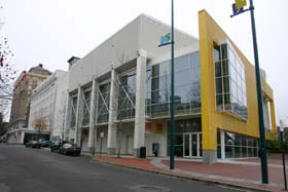Last weeks decision by the Tacoma Actors Guild (TAG) to end its season early left ticket-holders frustrated, and board members scrambling to find ways to appease audiences and balance the books.
As theatre-goers arrived Thursday evening to watch TAGs production of the Chaps! holiday play, they were greeted by board members and bad news: the theatre was $300,000 to $350,000 in debt, and Columbia Bank froze its account (though TAG had $30,000 in the account, it had an outstanding note of approximately $165,000).
The result?
Postponed productions of The Glass Menagerie (Jan. 12 – Jan. 30), Sleuth (Feb. 16 – Mar. 6), and The Comedy of Errors (Mar. 23 – Apr. 10); and the resignations of TAGs artistic director Pat Patton and board president Shelley Angelo.
TAGs announcement devastated Tacomas theatre audience. It also provided a sobering look at this citys theatre-business climate.
To be sure, mid-sized theatres like TAG are struggling locally (Empty Space Theatre in Seattle will close Jan. 15 unless it raises $350,00) and nationally (according to Theatre Facts 2003, a report on the national theatre business by Theatre Communications Group, nearly 60 percent of the 85 nonprofit theaters surveyed for the report ended last year with a deficit).
For several key reasons, however, Tacoma is a uniquely challenging place to run a theatre production business.
I think the challenge in Tacoma is the type of theatre that can be produced, says Jon Douglas Rake, Artistic Director at the Tacoma Musical Playhouse (TMP). Tacoma audiences arent willing to take risks. They like standards. TAGs challenge was to find that happy road in the middle, yet challenge the audience as well.
Indeed, when TAG staged Baltimore Waltz in 2002, more than two-dozen incensed ticketholders complained to TAGs management. The play was indirectly about AIDS and contained implied sexual content.
Another challenge is corporate funding.
Tacoma doesnt have the same number of large corporations like Seattle, says Rake. In this city, we often compete for the same money. Rake adds that corporate sponsorship is difficult everywhere, but particularly tough in Tacoma.
Josie Turner, Manager of Tacoma Economic Development Departments Culture & Tourism Division, agrees with Rake.
Its always a challenge, especially in this economic climate, for arts organizations to find funding, she says. I wouldnt say organizations are fighting over funds, but the pool of money is a constant, and thats definitely a challenge. Until there are ways to enlarge that pool, there is always going to be that problem.
Turner points out that Tacoma audiences have changed from subscribers to single-ticket purchasers, which has impacted the theatre business.
Historically, we have seen subscriptions drop, which have been the backbone of theatres, and single-ticket sales rise, she says. People arent planning their lives around season-long subscriptions.
This change has contributed to a level of financial uncertainty in an already fiscally fragile industry. According to TAG, a drop in the number of season-ticket subscribers and a rise in unpredictable and uneven single-ticket sales contributed to its struggle.
Area theatres also face the challenge of presenting material with a ticket-price affordable to all audiences.
If theatres charged the true price of production costs, says Turner, many people wouldnt have access to the arts. Thats something that arts organizations want to do — make theatre accessible to all residents of Tacoma.
Funding problems, like those at TAG, make that tough, according to Turner. Still, Turner believes that TAGs problems are more indicative of the inherent business of theatre, rather than any shortcomings of Tacomas theatre scene. She argues that small theatres such as Shakespeare in the Parking Lot and the TMP have had success in Tacoma by finding a specific niche with audiences.
Indeed, TMP has survived for 11 years. Artistic director Rake reports that his theatre had a banner year in 2003. The theatre is tentatively planning a benefit for TAG on Jan. 26.
Musical theatre is easier to sell, he says. We do new things as well, but we have built a trust with our audience. Our audience knows that these newer productions will work.








